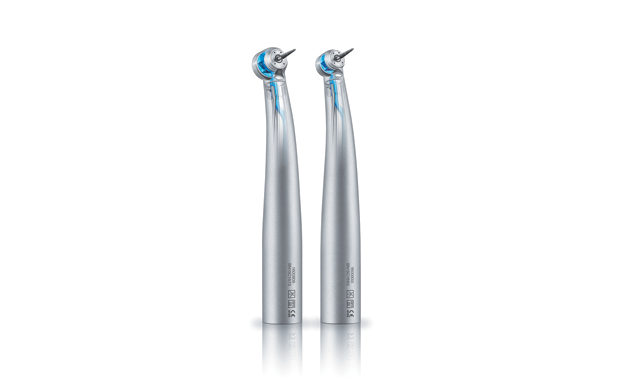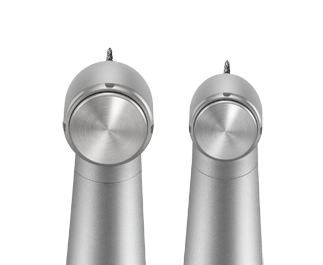An inside look at the new Tornado S handpiece
How the team at Bien-Air made minor adjustments to create the most powerful small-head handpiece in the market.

When the Tornado handpiece was introduced to the market in 2015, Bien-Air was surprised to see that its sales numbers were three times higher than anticipated. Dentists liked the powerful but quiet handpiece, which could explain why more than 90 percent of the dentists who tried the handpiece ended up purchasing it.
Three years later, the team at Bien-Air has turned some minor adjustments into major improvements, unveiling the new TornadoS.

“Our first priority was to come out with the most powerful handpiece in the world, so we launched the Tornado,” says Daniel Call, western regional sales manager at Bien-Air. “It set the benchmark and established the brand that was able to achieve the most power with the longest warranty. The next job was to make a handpiece that could be used more generally but still have the most power in its class, the lowest noise in its class and the longest warranty in its class.”
With a head size that’s 30 percent smaller than the Tornado, the TornadoS is the most powerful small-head handpiece in the market, thanks to the fact that it utilizes a miniaturized Pelton turbine.
Related reading: The power of a handpiece
“This Pelton turbine creates very efficient exhaust, so the air escapes before the next rotor blade comes in contact with it, generating a very high power of 24 watts,” Call says. “That’s the same amount of power that’s generated by the standard head sizes of a lot of major brands, so we’ve been able to accomplish the power of a large head in a small head with the Pelton turbine technology.”
That power is paired with ease of use offered by its air-cushion swivel.
“The handpiece literally swivels on a cushion of air,” Call says. “All of the other couplers on the market are retention swivels. There is contact between the swivel and the handpiece, and that friction makes it difficult to swivel.”
With a handpiece that was already known to be lighter, quieter and more comfortable to use, why did the team at Bien-Air feel the need to make improvements? The answer, it turns out, is visibility.
“In the rest of the world, dentists order handpieces in sets,” Call says. “They order a large handpiece for their very large, heavy-lifting jobs like removing non-precious metal crowns and doing bulk enamel reductions on molars and anterior teeth. They want a very strong handpiece and for those jobs, the power is the most important quality. In combination with a very high-powered handpiece, they also have on their dental unit a smaller head handpiece. This is for their finishing work. It’s the handpiece that enables them to get into those smaller and tighter areas.
“In the U.S., it’s a little different,” Call explains. “Dentists usually pick one handpiece and use it exclusively.”
For dentists who rely on one tool to do a range of tasks, it’s important to have the best of both worlds, and that’s what the TornadoS aims to offer.
“The number one concern with air-driven users in the U.S. - after reliability and power - is visibility,” Call says. “The smaller head design provides a visibility angle of 21.5 degrees - the highest on any small-head handpiece in its class.”
For dentists who have tried the Tornado and appreciate the power but are looking for something with a smaller head, the TornadoS is their answer.
“It will give them the power that they’re not used to experiencing in a size that allows them to work in space-restricted areas,” Call says. “We were looking to fill in that gap.”
Call believes that the TornadoS blows the existing concept of a small-head handpiece out of the water.
More from the author: 8 ways to make insurance less of a pain
“Usually what you expect when a brand has a big-head handpiece and a small-head handpiece is that the small-head handpiece will have a shorter warranty,” he says. “But with the TornadoS, we are able to offer the same available three-year warranty. It’s more of an all-in-one handpiece.”
Bien-Air’s goal is to simplify the day-to-day work of practitioners, and Call says the TornadoS does that by reducing the time that the patient is in the chair.
“It simplifies the working life of the practitioner by offering the lowest noise level in its class, which puts the patient at ease,” he says. “It’s a lot easier to work in the mouth when the patient is comfortable.
“Also, the reliability and warranty of the handpiece let dentists do what dentists do best. We want them working at the chair, but when they have a handpiece that breaks down all the time, they are forced to focus their attention on maintaining and repairing these handpieces. But with our available three-year warranty, the clinician can get back to doing what he or she does best."
ACTIVA BioACTIVE Bulk Flow Marks Pulpdent’s First Major Product Release in 4 Years
December 12th 2024Next-generation bulk-fill dental restorative raises the standard of care for bulk-fill procedures by providing natural remineralization support, while also overcoming current bulk-fill limitations.